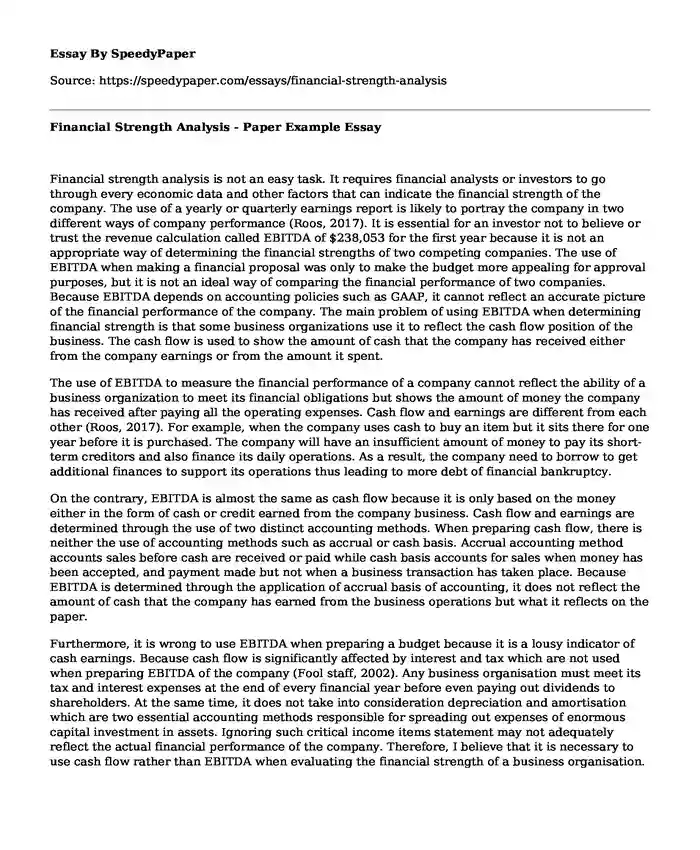
| Type of paper: | Course work |
| Categories: | Business plan Business management Financial analysis Financial management |
| Pages: | 3 |
| Wordcount: | 631 words |
Financial strength analysis is not an easy task. It requires financial analysts or investors to go through every economic data and other factors that can indicate the financial strength of the company. The use of a yearly or quarterly earnings report is likely to portray the company in two different ways of company performance (Roos, 2017). It is essential for an investor not to believe or trust the revenue calculation called EBITDA of $238,053 for the first year because it is not an appropriate way of determining the financial strengths of two competing companies. The use of EBITDA when making a financial proposal was only to make the budget more appealing for approval purposes, but it is not an ideal way of comparing the financial performance of two companies. Because EBITDA depends on accounting policies such as GAAP, it cannot reflect an accurate picture of the financial performance of the company. The main problem of using EBITDA when determining financial strength is that some business organizations use it to reflect the cash flow position of the business. The cash flow is used to show the amount of cash that the company has received either from the company earnings or from the amount it spent.
The use of EBITDA to measure the financial performance of a company cannot reflect the ability of a business organization to meet its financial obligations but shows the amount of money the company has received after paying all the operating expenses. Cash flow and earnings are different from each other (Roos, 2017). For example, when the company uses cash to buy an item but it sits there for one year before it is purchased. The company will have an insufficient amount of money to pay its short-term creditors and also finance its daily operations. As a result, the company need to borrow to get additional finances to support its operations thus leading to more debt of financial bankruptcy.
On the contrary, EBITDA is almost the same as cash flow because it is only based on the money either in the form of cash or credit earned from the company business. Cash flow and earnings are determined through the use of two distinct accounting methods. When preparing cash flow, there is neither the use of accounting methods such as accrual or cash basis. Accrual accounting method accounts sales before cash are received or paid while cash basis accounts for sales when money has been accepted, and payment made but not when a business transaction has taken place. Because EBITDA is determined through the application of accrual basis of accounting, it does not reflect the amount of cash that the company has earned from the business operations but what it reflects on the paper.
Furthermore, it is wrong to use EBITDA when preparing a budget because it is a lousy indicator of cash earnings. Because cash flow is significantly affected by interest and tax which are not used when preparing EBITDA of the company (Fool staff, 2002). Any business organisation must meet its tax and interest expenses at the end of every financial year before even paying out dividends to shareholders. At the same time, it does not take into consideration depreciation and amortisation which are two essential accounting methods responsible for spreading out expenses of enormous capital investment in assets. Ignoring such critical income items statement may not adequately reflect the actual financial performance of the company. Therefore, I believe that it is necessary to use cash flow rather than EBITDA when evaluating the financial strength of a business organisation.
References
Roos, D. (2017). What is EBITDA? Journal of financial analysis, 2(2017), 1-3. Retrieved from file:///C:/Users/Hp/Downloads/M5_What_Is_EBITDA.pdf
Fool staff, M. (2002). What is EBITDA? Fool.com, 1(2002), 1-4. Retrieved from https://www.fool.com/specials/2002/07/16/foolcom-what-is-ebitda-special-july-16-2.aspx
Cite this page
Financial Strength Analysis - Paper Example. (2022, Dec 23). Retrieved from https://speedypaper.com/essays/financial-strength-analysis
Request Removal
If you are the original author of this essay and no longer wish to have it published on the SpeedyPaper website, please click below to request its removal:
- Essay Example on Regeneration and Wound Repair
- Mary Shelley's Frankenstein: Nature vs. Nurture. Literary Essay Sample.
- Free Essay on the Eighteenth-Century Politics of Consumption: The Boston Tea Party
- Free Essay Describing The United Kingdom Economy
- Homer Hickman's Heroic Journey, Conflicts and Obstacles. Paper Example
- Essay Sample on Evolution of Disaster Recovery Plans
- Paper Example on Strategy Selection, implementation, and Evaluation
Popular categories




